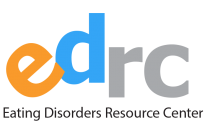Eating disorders are both psychological health and physical health issues, and require more than just weight gain and nutritional counseling to overcome. Complex family, social, and individual psychological issues or biochemical predispositions often impact eating disorders. These complex factors may cause an individual to turn to restricting, binge eating, purging, or compulsively exercising as a means of coping.
The most important thing to know about eating disorders treatment is that early intervention makes a difference in success! The sooner an individual suffering from an eating disorder receives treatment, the more likely she or he will be to recover.
Treatment involves an overall assessment, including history, current symptoms, physical status, family or personal issues, and the presence of other disorders, such as anxiety disorders, depression, and / or substance abuse. The most effective treatments of eating disorders include psychotherapy or psychological counseling along with medical and nutrition support and guidance. A team of professionals such as nutritionists, medical professionals, and therapists work together to develop a treatment plan that is individually tailored to meet the specific problems, needs, and strengths of the individual. Individuals suffering from eating disorders are subject to a variety of physical and medical concerns. Careful medical monitoring is essential to all forms of therapy, including outpatient therapy.
Psychological counseling needs to address both the eating disorder behaviors and the underlying psychological, interpersonal and cultural forces that contributed to the eating disorder. It is important for those struggling with an eating disorder to find a mental health professional they trust to assist in developing and coordinating their treatment plan.
Treatment Options:
Depending on the severity of the eating disorder, the patient may undergo group therapy, individual therapy, outpatient hospital care, or partial hospitalization, intensive outpatient, residential treatment care, or inpatient hospital care. Eating disorder therapy strategies may include (but are not limited to) cognitive behavioral therapy, interpersonal psychotherapy, family therapy, and behavioral therapy. Psychiatric medications have an established role in the treatment of eating disorders and may be part of an individualized treatment plan.
Outpatient Therapy: Sessions have proven effective for many individuals with eating disorders. This form of therapy may involve weekly meetings between the client and health professionals and participation in support groups. Nutritional counseling is done, preferably by a registered dietitian specializing in eating disorders.
Partial Hospitalization Programs: Are usually daylong programs for clients who may need more structure and contact than outpatient treatment can provide. These programs provide structured eating situations and active treatment interventions while allowing the individual to spend evenings at home and, in many cases, continue to work or attend school.
Intensive Outpatient Therapy: Is simply a more intense form of outpatient therapy. Clients attend therapy sessions several days per week for several hours at a time.
Residential Care Facilities: Provides long-term treatment for individuals with progressed eating disorders. The treatment needs of individuals will vary.
Inpatient Programs: Provides a structured treatment environment in which the client has access to clinical support 24 hours a day. Many programs are affiliated with day and outpatient programs that allow clients to step up or down to the appropriate level of care depending on their clinical needs.
Remember:
Eating disorders are physically and emotionally destructive! People with eating disorders need to seek professional help immediately. If not identified or treated in their early stages, eating disorders can become chronic, debilitating, and life threatening.
*Adapted from the Eating Disorder Referral and Information Center at www.edreferral.com/treatment.htm

